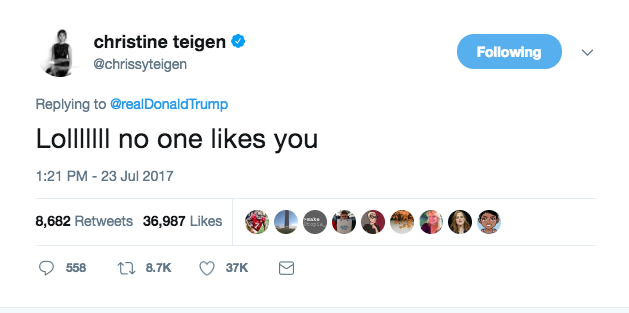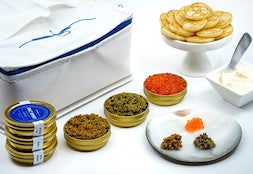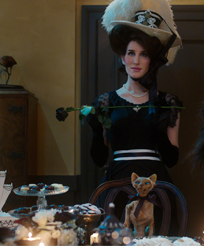Remember when Chrissy Teigen confessed to her own armpit liposuction? Remember when she fell asleep at the Oscars? Remember when she unleashed a tweetstorm about an eight-hour flight-to-nowhere? Remember when she valiantly fought to #freethenipple? Remember when she got dragged into a child prostitution right-wing conspiracy theory? Remember when she “got real about her postpartum depression and privilege”? Remember when she “delivered the perfect clapback to body-shamers”? Remember when she got blocked by Trump on Twitter? Remember when she live-snapped the fake Fake News Awards?
Chrissy Teigen, mother, wife, swimsuit model, food blogger, occasional game show sidekick, pizza lover, video gamer, cookbook author, social media goddess, ur-“influencer,” is the ultimate cool girl. She’s glamorous yet relatable, extraordinary yet ordinary, gorgeous yet flawed, outspoken yet un-self-righteous, flip yet sincere, a model who buttresses the intrinsic vanity of the task with frequent self-deprecation. She’s the girl every girl wants to be and every guy wants to date. She’s a walking apotheosis of the “Stars, They’re Just Like Us” page, except instead of taking out the trash, she’s exposing her pregnancy stretch marks and sharing her disdain for her own butthole. She is 100% on Rotten Tomatoes. She is all of us, all the time, except she isn’t: her greatest trick is deluding us into thinking we’re anything like her, when we’re anything but—a feat that’s all the more exceptional when you consider it’s not a trick at all.
Teigen graced the cover of Maxim’s coveted calendar in the summer of 2007, when she was 22. She has been featured in campaigns for Gap, Olay, Nike and UGG, on the cover of magazines from Esquire to Cosmopolitan to Vogue. In 2010, she was named the Sports Illustrated swimsuit issue’s “Rookie of the Year,” and, in 2014, appeared on its cover with Lily Aldridge and Nina Agdal to celebrate its 50th anniversary. Since then, you might’ve seen her on Inside Amy Schumer, The Mindy Project or on Spike TV’s Lip Sync Battle, where she plays the loveable co-host alongside LL Cool J. She’s also hosted two specials for the Cooking Channel, and served as a judge for the understandably short-lived MTV cooking show, The Snack-Off. Her first cookbook, very appropriately named Cravings, became a New York Times bestseller; her second is forthcoming.
Before all that, though, Teigen starred in the music video for the song “Stereo,” performed by her future husband, Grammy award-winner John Legend. Prior to the shoot, she walked into his dressing room to find him ironing his underwear. After the shoot, they ate at In-N-Out, and subsequently hooked up at his hotel. Then she proceeded to “play it cool for a long time,” although eventually the two got hitched—and have been happily married ever since. In retrospect, this anecdote is central to Teigen’s cool-girl mythology. It reads like a meet-cute cooked up in a rom-com produced by the creators of Entourage.
Her enviable personal life, combined with her various high-profile occupations, threaten to push her out of touch with the general population. Instagrams and Snapchats and Tweets about a gorgeous model eating junk food—see also: a very on-brand McDonald’s commercial, which aired during this year’s Golden Globes—could be off-putting. After all, it’s only cool to eat like shit if you’ve got a great body. And yet Teigen has a keen awareness of the surreality of her own life, keenly anticipating what others will say about her and beating them to the punch; she has the wherewithal, as a public figure, and as a beautiful woman, to say all the bad things about herself (her body, her privilege) others might say before they have the chance.
“Models notoriously love to say they love eating pizza, and I always thought that was annoying. It’s, like, we’re not stupid,” Teigen told Harper’s Bazaar. “When I hear myself say those things I’m, like, ‘I am that annoying girl that I hate...' I love eating bad [stuff], but, obviously, I can’t eat like that all the time. And I’m not Instagramming or Snapchatting my workouts so it does seem like I might just eat bad food and never work out.”
Optically, this is pure image savvy; by undermining the artificiality of her own persona, she achieves greater authenticity. But on a deeper level it lends her the appeal of—not a victim—but a relatable underdog.
It’s this aspect of Teigen that tends to distinguish her from other celebrities. She seems to understand, more clearly and without trying, that adoration lives at the intersection where her extraordinary life meets the less-extraordinary lives of her fans. Thus the trend of “opens up” headlines: “Chrissy Teigen Opens Up for the First Time About Her Postpartum Depression”; “Chrissy Teigen Opens Up About Her Need to Get Sober”; “Chrissy Teigen Opens Up About IVF Difficulties.” Her warts-and-all candor—about drinking too much, her plastic surgery, her struggles with motherhood, etc—is refreshingly un-calculated (or, if it is calculated, refreshingly un-calculated-seeming), especially in a nervous cultural moment where the choreographed charade of celebrity is hilariously transparent. It also sends the all-important message to her followers: I am just as fallible as you.
Undergirding all of this is a winning sense of cool-girl humor. By which I mean, Teigen knows she’s a cool girl, but also knows when and how to flaunt it. Consider the tweet that got her blocked by Donald Trump on Twitter.

It carries a Mean Girls-esque authority, evoking in its utter succinctness the most pointed critique a popular girl could give an attention-grubbing man-child: that I don’t like you, and therefore no one likes you, and I don’t even have the time of day to explain why. It’s a dismissal masquerading as a diss.
Mostly, however, Teigen keeps it light. She currently has 15.7 million followers on Instagram and 9.6 million followers on Twitter, where she is, without question, a master of the form. Her feed epitomizes the best aspects of an oft-lamentable vortex of cynicism and hate, mixing witticisms on the banal with self-deprecating personal confessions with unfiltered commentary on the politics-du-jour. Countless articles, some of which were very helpful in writing this one, have compiled a collection of her greatest tweets; it’s not a stretch to say that, from a sheer writing standpoint, the formulation of some of her best jokes are on par with legitimate comics’. This, too, contributes to her growing mythology, ticking off another box in her incidental rise to the throne of World’s Coolest Woman.
To be fair, though, there can be no such thing as the World’s Coolest Woman—not really. Teigen, to those who follow her on Twitter and Instagram, or watch her on TV, exists in the lacuna between reality and our collective imagination; she gives us a lot, more than most, but, as with any celebrity, we are left to fill in the blanks. Her unparalleled appeal lies in doling out enough authenticity to make this cool-as-hell fantasy seem real.













